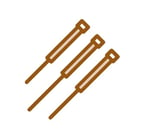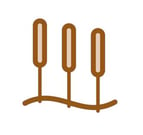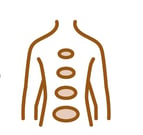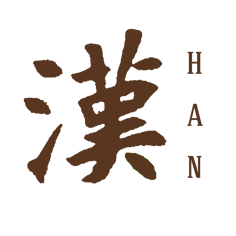Frequently Asked Questions
Q: What Can Acupuncture Treat?
Acupuncture is best known for the treatment of painful conditions such as headaches, back pain, sciatica, stiff shoulder, whiplash, tendinitis etc. Acupuncture is also used successfully for a wide range of physical or mental disorders such as arthritis, FMS, facial palsy, paralysis, allergy, asthma, acne, gastritis, colitis, menstrual or sexual problems, PMS, infertility, anxiety, fatigue, depressions, insomnia, running ear, and other ailments which have not responded to the medical and even surgical therapies, or for conditions for which the patient is sensitive to or does not want various medications. Acupuncture for smoking cessation has become popular because of its effectiveness. The World Health Organization (WHO) listed more than 100 conditions that Chinese Medicine and Acupuncture Can Treat.


Q: How does Acupuncture Work?
Health is a matter of balance. Human beings are complex bioelectric and automatic control systems. Unbalance of the body can reflect on the definite areas or points of the body surface as changes of sensitivity or electric resistance of the skin. So-called meridians are essentially the connecting pathways between different parts of the body, the upper and lower, the left and the right, the internal organs and the body surface. In the Western medicine, similar phenomenon is recognized as the referred pain areas used to help make diagnosis. The meridian system not only has more recognition about the internal connection of the body than the referred pain areas, but also works through bi-direction. Acupuncture on the corresponding points can input treatment signals to activate the automatic control function of the body and regulate balance back. For example, it is well known that the referred pain from angina pectoris is usually located the inner side of left forearm. Actually, that area is consistent with the Heart meridian and can be stimulated by acupuncture to relieve the chest pain or even improve the related EKG change.


Q: Does Acupuncture Hurt?
Usually not because the needles are hair-like. Although some patients are more sensitive than others and may feel a greater sensation (cramping, heaviness, distention, tingling, or electric sensation either around the needle or traveling up or down the affects energy pathway or meridian,) many patients feel nothing more than a dull pressure.


Q: Are the Needles Clean?
We use pre-sterilized, disposable needles thus absolutely assuring that there is no transmission of communicable disease from patients to patient due to contaminated needles.


Q: Is Acupuncture Safe?
Acupuncture is safely used throughout the entire world. It is estimated by the World Health Organization that one third of the world’s population uses this form of the therapy for health cares. Then utilized by a certified acupuncturist for knowledgeable physician, reactions to acupuncture therapy are indeed very rare.


Q: What Kinds Of Services Do We Provide?
We do traditional Chinese acupuncture, acupressure, auriculotherapy (ear acupressure), hand acupuncture, and may also utilize very low-grade electrical or magnetic stimulation or infrared rays (electric acupuncture and electromagnetic therapy). Also, we provide pulsing, formula herbs (Chinese Herbology), manipulations, and whatever is necessary.


Q: Is There Anything Else I Need To Do Before And While Receiving Acupuncture?
Yes. Wear loose clothing. Women should not wear on-piece dresses. Avoid wearing tight stockings. Avoid treatment when excessive fatigue, hungry, full, emotionally upset, or shortly after sex. While receiving acupuncture, there is no need to be frightened. RELAX. Do not change your position or move suddenly. Feel free to let your practitioner know of any sensations experienced during acupuncture.


Q: How Many Treatments Will I Need?
That depends upon the duration, nature of each individual’s complaint and the individual response of the patient. One may experience and immediate total or partial relief of their pain or other symptoms, another one may notice no change until several treatments. This relief may last or some of the pain may return. However one can be expected to gradually improve or see further incremental improvement after each subsequent treatment, Generally from five to fifteen treatments are needed for the majority of chronic ailments. Many acute conditions may only require a single treatment and degenerative conditions may require scores of treatments, treatments may be daily or just once or twice a week, depending on the process of the patient.
Q: Are There Different Results From Difference Acupuncturists?
Yes, there are. Owning to that same disease can be treated with different acu-points and/or various acupuncture techniques, the effectiveness varies with the experience and skill of the acupuncturists. A highly qualified practitioner may cure patients with the least sessions or help the tough patients than other acupuncturists.


Han Acuherbs
Visit Us
19B Leicester Road,
Blaby, Leicester
LE8 4GR
Contacts


